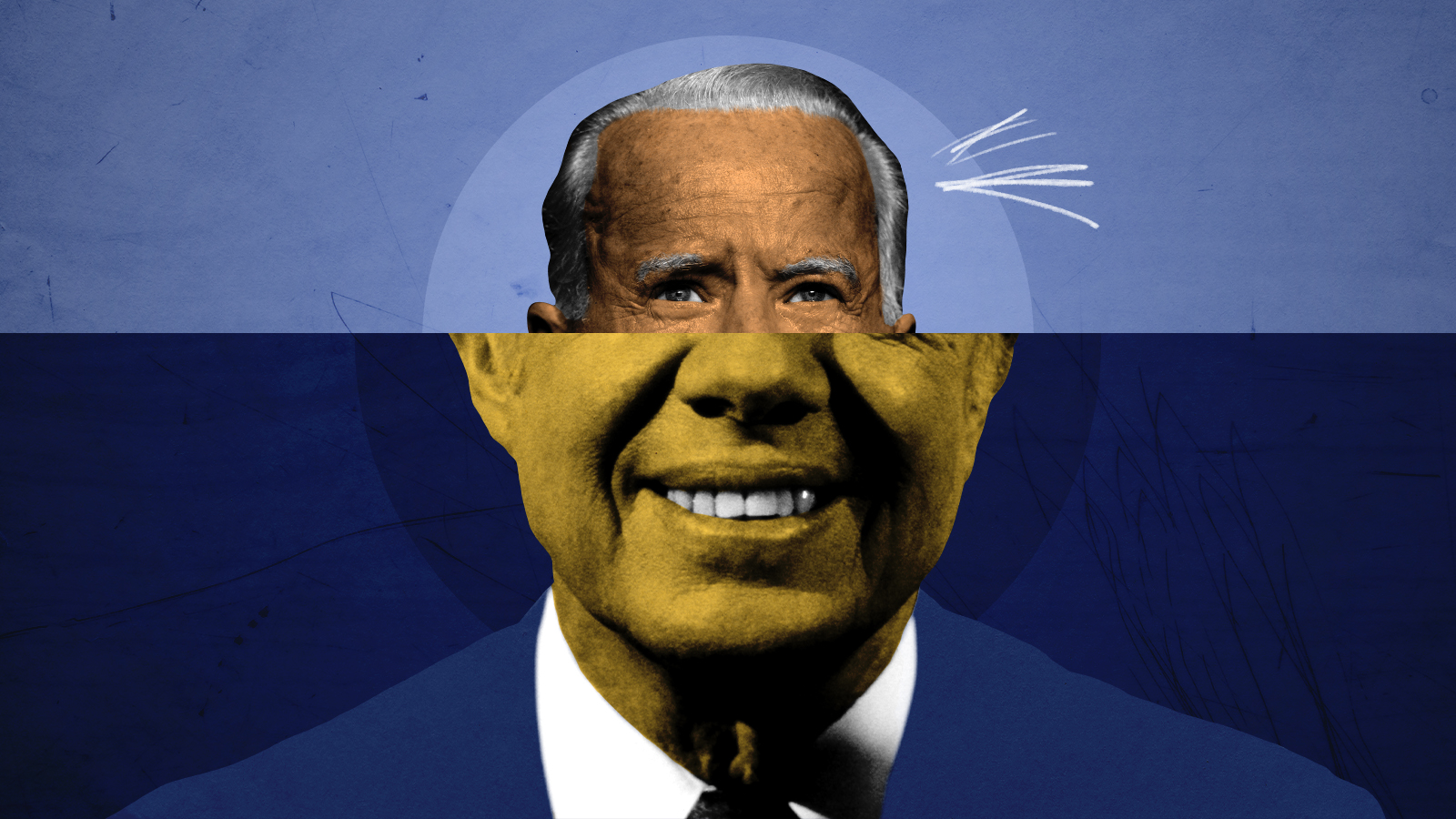Republicans really, really want Biden to be the new Jimmy Carter
Useful analysis or wishful thinking?


A free daily email with the biggest news stories of the day – and the best features from TheWeek.com
You are now subscribed
Your newsletter sign-up was successful
The victory of the Taliban in Afghanistan, along with the sometimes-chaotic withdrawal of American forces from that country, has produced a gusher of conservative commentary comparing President Joe Biden to his 1970s Democratic predecessor, Jimmy Carter. "This is Joe Biden's Jimmy Carter Moment" the New York Post declared. "He is like Jimmy Carter on acid," Meghan McCain, the former TV host, announced on Twitter. The conservative Washington Examiner had two different columnists connect the legacies of Biden and Carter in recent weeks, but that was restrained compared to the Wall Street Journal, where opinion pieces identifying Biden-Carter similarities have become almost routine.
Needless to say, Fox News has also jumped on the Biden-Carter bandwagon.
"Jimmy Carter only had a year of a hostage crisis," host Jesse Watters declared last week. "Joe Biden's going to have three years of a hostage crisis. I don't see how he survives this."
The Week
Escape your echo chamber. Get the facts behind the news, plus analysis from multiple perspectives.

Sign up for The Week's Free Newsletters
From our morning news briefing to a weekly Good News Newsletter, get the best of The Week delivered directly to your inbox.
From our morning news briefing to a weekly Good News Newsletter, get the best of The Week delivered directly to your inbox.
The message: Carter was a failed one-term Democratic president, undone to a considerable extent by the Iran hostage crisis, and now Biden — thanks to Afghanistan — is on track to duplicate Carter's fate. Conservative pundits, it appears, are trying to generate a miasma of failure around the current president.
Are they right? Probably not.
As Watters himself pointed out, the political timing for the two presidents is dissimilar. Carter faced the Iran crisis at the tail end of his first and only term in office, while Biden is still serving the first year of his presidency. Timing matters — a lot can happen in three years that might make the current situation a distant memory by the time 2024 comes around. The substantive differences are important, as well: Despite what Watters and other Fox hosts have asserted, the Taliban don't seem much interested in holding American hostages. They have, after all, expressed interest in maintaining diplomatic relations with the United States even after American troops have withdrawn from the country. No doubt those relations would be fraught after 20 years of war, and all bets are off if Afghanistan's instability leads to a terrorist attack on U.S. soil sometime soon. I think that's unlikely. Instead, as my colleague Noah Millman has written, there is a chance the Taliban could end up as American allies in the not-too-distant future. Even if that doesn't happen, it's far from a sure thing that voters will have an "Afghanistan crisis" on their minds by the time next year's midterm elections are held.
Besides, the most obvious and perhaps over-used point of comparison for Biden is clearly the fall of Saigon — the collapse of a U.S.-allied government after decades of vicious civil war. That defeat happened under a Republican president, though, as did the withdrawal of American troops from Vietnam that preceded it. Right-leaning commentators aren't spending much time comparing Biden to Gerald Ford or Richard Nixon these days, however.
A free daily email with the biggest news stories of the day – and the best features from TheWeek.com
Which means the Biden-Carter comparisons aren't really strictly considered analyses — instead, they're mostly a bit of wish-casting by the right-wing pundits. In conservative mythology, the paradise of Ronald Reagan's "Morning in America" presidency was preceded by the darkness of the Carter years, a time of high inflation, humiliation abroad, and low morale at home. Republicans are clearly rooting for history to repeat itself. If that doesn't work, perhaps ritually using Carter's name over and over again — like saying the name "Beetlejuice" three times in a row — will conjure a new GOP ascendancy.
Indeed, conservative writers and politicians were already invoking Carter while commenting on the Biden presidency long before Kabul fell to the Taliban. Sen. Ted Cruz (R-Texas) called Biden "Jimmy Carter 2.0" at the beginning of July. Donald Trump offered a similar comment in May, as did Liz Peek at Fox News and former Trump official Robert Wilkie at The National Interest. Trump's comment prompted U.S. News & World Report to observe that "GOP lawmakers and 2024 presidential wannabes are hoping that tying Biden to Carter will prove a winning gambit." This isn't a new trick. During Barack Obama's presidency, a number of conservative writers all tried and failed to persuade the public that the younger president was "the new Jimmy Carter." Whenever conservatives look at a Democratic president, it seems all they see is a peanut farmer.
The irony is that Carter's reputation has probably never been better. He has long been considered one of the best ex-presidents, thanks to his post-White House activism both at home and internationally. His presidency is getting a fresh look, too, with some historians saying Carter deserves credit for his efforts at Middle East peace, arms control, and domestic deregulation. It's not clear, though, how much this legacy — good or bad — is salient to current voters: Most Americans living today weren't even born when Carter left the White House in January 1981.
Maybe conservatives can make the charge stick this time. Perhaps some mix of circumstances — continued high inflation, unsettled labor markets, and international crises — will drag down Biden, and with him his party's chances of keeping the White House in 2024. Or perhaps they won't. Either way, Biden surely won't be the last Democratic president that Republicans try to stick with the "Jimmy Carter" brand.
Joel Mathis is a writer with 30 years of newspaper and online journalism experience. His work also regularly appears in National Geographic and The Kansas City Star. His awards include best online commentary at the Online News Association and (twice) at the City and Regional Magazine Association.
-
 Buddhist monks’ US walk for peace
Buddhist monks’ US walk for peaceUnder the Radar Crowds have turned out on the roads from California to Washington and ‘millions are finding hope in their journey’
-
 American universities are losing ground to their foreign counterparts
American universities are losing ground to their foreign counterpartsThe Explainer While Harvard is still near the top, other colleges have slipped
-
 How to navigate dating apps to find ‘the one’
How to navigate dating apps to find ‘the one’The Week Recommends Put an end to endless swiping and make real romantic connections
-
 How are Democrats trying to reform ICE?
How are Democrats trying to reform ICE?Today’s Big Question Democratic leadership has put forth several demands for the agency
-
 The ‘mad king’: has Trump finally lost it?
The ‘mad king’: has Trump finally lost it?Talking Point Rambling speeches, wind turbine obsession, and an ‘unhinged’ letter to Norway’s prime minister have caused concern whether the rest of his term is ‘sustainable’
-
 Is Alex Pretti shooting a turning point for Trump?
Is Alex Pretti shooting a turning point for Trump?Today’s Big Question Death of nurse at the hands of Ice officers could be ‘crucial’ moment for America
-
 Halligan quits US attorney role amid court pressure
Halligan quits US attorney role amid court pressureSpeed Read Halligan’s position had already been considered vacant by at least one judge
-
 House approves ACA credits in rebuke to GOP leaders
House approves ACA credits in rebuke to GOP leadersSpeed Read Seventeen GOP lawmakers joined all Democrats in the vote
-
 The billionaires’ wealth tax: a catastrophe for California?
The billionaires’ wealth tax: a catastrophe for California?Talking Point Peter Thiel and Larry Page preparing to change state residency
-
 Vance’s ‘next move will reveal whether the conservative movement can move past Trump’
Vance’s ‘next move will reveal whether the conservative movement can move past Trump’Instant Opinion Opinion, comment and editorials of the day
-
 Bari Weiss’ ‘60 Minutes’ scandal is about more than one report
Bari Weiss’ ‘60 Minutes’ scandal is about more than one reportIN THE SPOTLIGHT By blocking an approved segment on a controversial prison holding US deportees in El Salvador, the editor-in-chief of CBS News has become the main story
